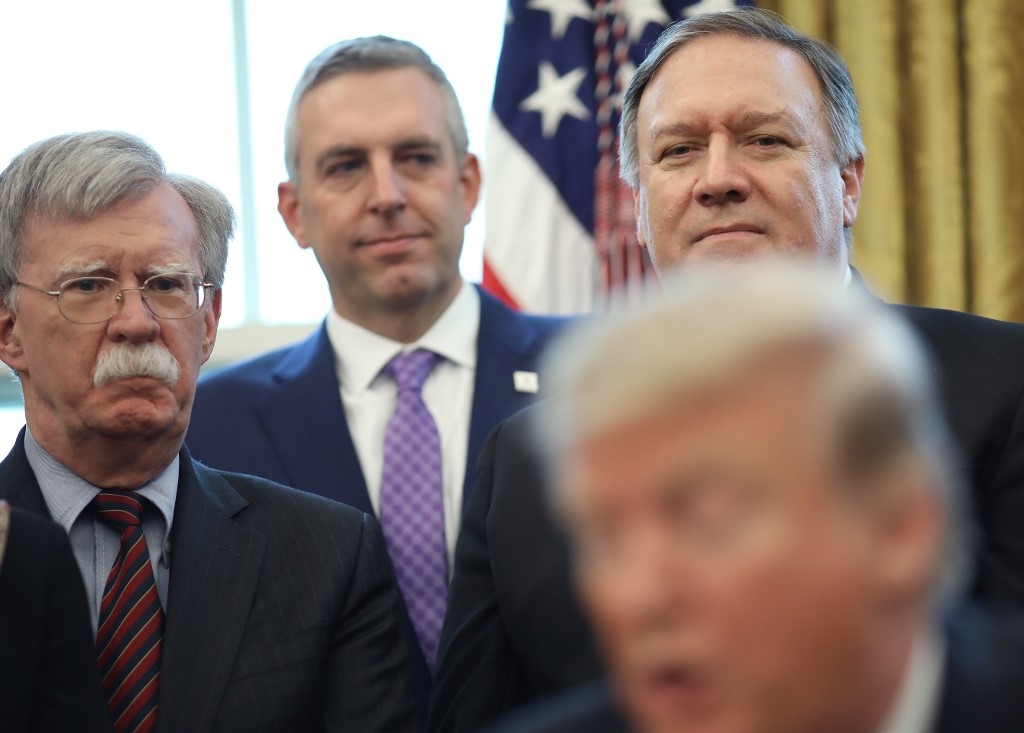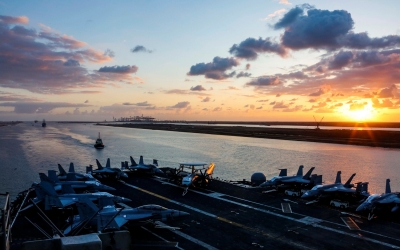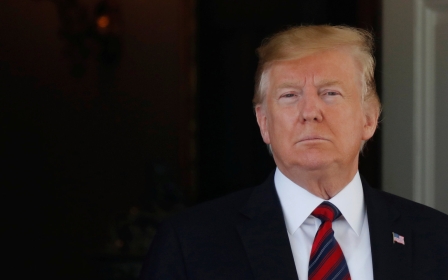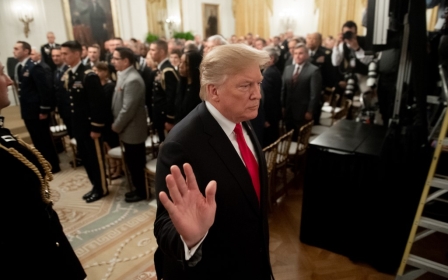The dubious Iran and al-Qaeda link Trump could use to go to war

The militant group al-Qaeda has a strong connection to Iran, the United States has claimed as part of its recent push towards war with the country.
US Secretary of State Mike Pompeo told the Senate Foreign Relations Committee in a hearing in April that the militant group operates in Iran and has contacts with the government in Tehran.
"There is no doubt there is a connection between the Islamic Republic of Iran and al-Qaeda. Period. Full stop," Pompeo contended.
"The factual question with respect to Iran's connections to al-Qaeda is very real. They have hosted al-Qaeda. They have permitted al-Qaeda to transit their country," he added.
Still, some observers have raised concerns that more hawkish members of President Donald Trump's administration are attempting to use an unproven connection between al-Qaeda and Iran to go to war.
Under the Authorization for Use of Military Force (AUMF), a law that was passed in the aftermath of the 9/11 attacks, such a connection may allow the White House to militarily confront Iran without Congressional approval.
Al-Qaeda and Iran?
But the purported link between Iran and al-Qaeda has been described as flimsy, unsubstantiated and even a "Big Lie," depending on whom you ask.
According to declassified al-Qaeda documents obtained by US military forces during the Abbottabad raid - the US operation in Pakistan that killed al-Qaeda leader Osama bin Laden - the militant group had established a presence in Iran, US news outlets reported.
Hamza bin Laden, one of Osama's sons and a rising leader in the group, sought shelter and got married in Iran, The Atlantic reported in 2017.
Another al-Qaeda operative, Mahfouz Ibn El Waleed, who is wanted for questioning by the FBI for alleged involvement in the 1998 attacks on US embassies in East Africa, boarded a bus from Pakistan to Iran shortly after the 9/11 attacks, according to the declassified documents.
Once Waleed arrived in Iran, according to The Atlantic's analysis of the documents, an element within Iran's Revolutionary Guards, known as the Quds Force, took him in. Waleed allegedly met with General Qassem Soleimani, who now heads the Revolutionary Guard.
Iran, however, felt that al-Qaeda's presence could be used as a bargaining chip with the US, and, in December 2001, Iranian officials told the US that they were willing to hand over the militants as a gesture of goodwill.
The US reportedly denied that offer, and one month later, president George W Bush said Iran was part of the "axis of evil".
The Atlantic, citing the declassified documents, also said that Hamza and a collection of other al-Qaeda operatives received training from Quds Force members and then were sent to Baghdad to attack US troops.
Other people who have read the declassified documents have disputed the claims that the Quds Force trained al-Qaeda militants.
Nelly Lahoud, a senior fellow at the New America Foundation and author of a book on al-Qaeda and Iran, said that she did not find any evidence of such an alliance.
In none of these documents did I find references pointing to collaboration between al-Qaeda and Iran to carry out terrorism
- Nelly Lahoud, New America Foundation
"In none of these documents did I find references pointing to a collaboration between al-Qaeda and Iran to carry out terrorism," she said in an Atlantic Council blog post in September 2018.
Instead, Lahoud said she found evidence of anger between the two. "Explicit hostile references to Iran are consistent throughout, displaying the mistrust of bin Laden and other al-Qaeda leaders towards Iranian authorities," she wrote.
She also referenced a document, believed to have been written by an al-Qaeda militant in March 2002, that described how Iran was implementing a policy "of arrests and deportation" of members of the militant group.
Moreover, at the start of the Arab Spring in 2011, Osama bin Laden's own "references to Iran were marginal, and consistently negative," Lahoud said.
The AUMF
In addition to the scant evidence indicating a connection between Iran and al-Qaeda, legal experts also question whether the AUMF, which remains in effect, actually gives the Trump administration the right to declare war on Iran.
Congress passed the AUMF days after the 11 September attacks, granting the US president the authority to use military force against the Taliban and al-Qaeda in Afghanistan without congressional approval.
Specifically, the 2001 law gave then president George W Bush the authority "to use all necessary and appropriate force against those nations, organisations, or persons he determines planned, authorised, committed, or aided the terrorist attacks that occurred on September 11, 2001".
It also gave Bush the power to target any nation, organisation or person that "harboured" any organisation or person the US deemed involved in the 9/11 attacks, "in order to prevent any future acts of international terrorism against the United States".
The associated forces doctrine has raised concerns that the 2001 AUMF is too elastic, allowing mission creep to potentially drag the US into a 'Forever War' against entities that arguably pose little or no direct threat to US national security
- University of Pennsylvania policy brief, April 2018
A year later, the Bush administration introduced - and Congress approved - another AUMF, this time authorising the US to "defend the national security of the United States against the continuing threat posed by Iraq".
The US, which invaded Iraq in 2003, had argued that its military campaign there was justified as part of its efforts to hold responsible those who aided the 9/11 attacks. That connection between Iraq and the 9/11 attackers later turned out to be false.
Subsequently, former president Barack Obama expanded the scope of the 2001 AUMF to include "forces associated" with al-Qaeda and the Taliban, both inside and outside of Afghanistan.
With that, Obama authorised controversial drone strikes in Yemen, Libya, Syria, Iraq, and elsewhere.
The expanded designation also added al-Qaeda in the Arabian Peninsula (AQAP), Somalia's al-Shabaab, "individuals who are part of al-Qaeda in Libya," "al-Qaeda in Syria" and the Islamic State (IS) group to the list of approved US targets.
"The associated forces doctrine has raised concerns that the 2001 AUMF is too elastic, allowing mission creep to potentially drag the US into a 'Forever War' against entities that arguably pose little or no direct threat to US national security," the Center for Ethics and the Rule of Law at the University of Pennsylvania said in a policy paper in April 2018.
'Leave that to lawyers'
As tensions escalated between Iran and the US, which accused Tehran of displaying aggressive behaviour and posing a threat to American and allied forces in the Middle East, observers have warned the Trump administration to exercise caution.
But certain high-ranking officials, including Pompeo and White House adviser John Bolton, have pushed for hardline actions against Iran.
"Bolton, a longtime proponent of preventive war, favours actions that many would consider an unauthorised use of military force," the Center for Ethics and the Rule of Law said in its report last year.
In his Senate Foreign Affairs Committee testimony last month, Pompeo did not rule out the possibility of using the AUMF to invoke war with Iran.
"I would prefer just to leave that to lawyers," he said, when asked whether the Trump administration would use the mechanism.
This is beyond a lie; Iran support for for al-Qaeda is Goebbels-style Big Lie, on which UAE’s Alarabiya did a propaganda ‘documentary,’ so Pompeo could go to war https://t.co/IcXRRJiI3x
— Juan Cole (@jricole) May 11, 2019
Some conservative voices in the US also recently said that the Trump administration would have a strong legal argument to invoke the AUMF.
"If the facts show Iran or any other nation is harbouring al-Qaeda, that's a circumstance which would make the argument for the applicability of the 2001 AUMF quite strong," retired Air Force Major General Charles J Dunlap Jr told right-wing newspaper The Washington Times in February.
"After all, al-Qaeda was directly responsible for the 9/11 attacks Congress was addressing at that time. Since Congress chose not to put a 'sunset' provision in the resolution, it remains good law," said Dunlap.
Still, that argument has been disputed by others.
Steve Vladeck and Tess Bridgeman at Just Security, a website run by the Reiss Center on Law and Security at New York University School of Law, called the Washington Times report "a trial balloon".
While criticising the piece for citing a slew of anonymous sources and being based on hypotheticals, they questioned the claim that Iran is harbouring al-Qaeda. "It's not remotely clear as a matter of fact or as a matter of law that such a claim holds water," they wrote.
Further, it's unclear whether the 2001 AUMF would even apply to Iran in this case, Bridgeman wrote last year.
"It's questionable whether the 2001 AUMF would apply to a country harbouring [al-Qaeda] today, as opposed to a country that 'harboured' (past tense) those groups on or before 9/11, the clear intent of the statutory authorisation," she wrote.
"At least without more information, it's hard to see how this adds up to a legitimate claim that the 2001 AUMF would authorise the use of force against Iran for having 'harboured' those who committed the 9/11 attacks."
Lawmakers demand oversight
US lawmakers have for years sought to restrict the current AUMF amid concerns the legislation is too broad and has been liberally applied to pull the US into a series of military conflicts in the Middle East.
Last month, shortly before tensions increased between Washington and Tehran, a bipartisan group of US senators introduced legislation that would prohibit the Trump administration from unilaterally attacking Iran without Congress's approval.
The bill, called the Prevention of Unconstitutional War with Iran Act of 2019, states that "no funds may be used for kinetic military operations in or against Iran" without approval from Congress.
"The ongoing saber-rattling inches us closer and closer to conflict, borrowing from the same playbook that launched us into the failed invasion of Iraq, and endangering our national security, jeopardising our diplomatic interests and alarming our allies," Democratic Senator Tom Udall, one of the bill's co-sponsors, said in a statement.
"The consequences of war with Iran would be catastrophic ... Congress must assert its constitutional authority to halt the march to war."
Middle East Eye propose une couverture et une analyse indépendantes et incomparables du Moyen-Orient, de l’Afrique du Nord et d’autres régions du monde. Pour en savoir plus sur la reprise de ce contenu et les frais qui s’appliquent, veuillez remplir ce formulaire [en anglais]. Pour en savoir plus sur MEE, cliquez ici [en anglais].






